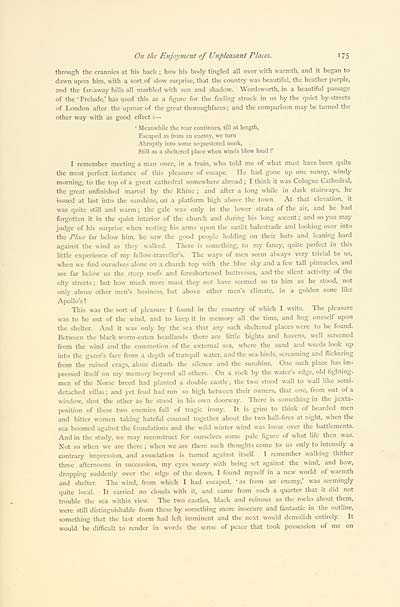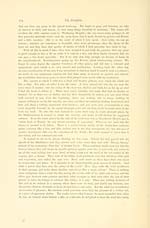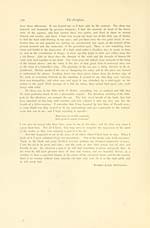Non-Fiction > Uncollected essays > Volumes 5-6, 1874-1875 - Portfolio > Volume 5
(19) Page 175
Download files
Complete book:
Individual page:
Thumbnail gallery: Grid view | List view

On the Enjoyment of Unpleasant Places. 1 75
through the crannies at his back ; how his body tingled all over with warmth, and it began to
dawn upon him, with a sort of slow surprise, that the country was beautiful, the heather purple,
and the far-away hills all marbled with sun and shadow. Wordsworth, in a beautiful passage
of the ' Prelude,' has used this as a figure for the feeling struck in us by the quiet by-streets
of London after the uproar of the great thoroughfares ; and the comparison may be turned the
other way with as good effect : — ■
' Meanwhile the roar continues, till at length,
Escaped as from an enemy, we turn
Abruptly into some sequestered nook,
Still as a sheltered place when winds blow loud !'
I remember meeting a man once, in a train, who told me of what must have been quite
the most perfect instance of this pleasure of escape. He had gone up one sunny, windy
morning, to the top of a great cathedral somewhere abroad ; I think it was Cologne Cathedral,
the great unfinished marvel by the Rhine ; and after a long while in dark stairways, he
issued at last into the sunshine, on a platform high above the town. At that elevation, it
was quite still and warm ; the gale was only in the lower strata of the air, and he had
forgotten it in the quiet interior of the church and during his long ascent ; and so you may
judge of his surprise when resting his arms upon the sunlit balustrade and looking over into
the Place far below him, he saw the good people holding on their hats and leaning hard
against the wind as they walked. There is something, to my fancy, quite perfect in this
little experience of my fellow-traveller's. The ways of men seem always very trivial to us,
when we find ourselves alone on a church top with the blue sky and a few tall pinnacles, and
see far below us the steep roofs and foreshortened buttresses, and the silent activity of the
city streets ; but how much more must they not have seemed so to him as he stood, not
only above other men's business, but above other men's climate, in a golden zone like
Apollo's !
This was the sort of pleasure I found in the country of which I write. The pleasure
was to be out of the wind, and to keep it in memory all the time, and hug oneself upon
the shelter. And it was only by the sea that any such sheltered places were to be found.
Between the black worm-eaten headlands there are little bights and havens, well screened
from the wind and the commotion of the external sea, where the sand and weeds look up
into the gazer's face from a depth of tranquil water, and the sea-birds, screaming and flickering
from the ruined crags, alone disturb the silence and the sunshine. One such place has im-
pressed itself on my memory beyond all others. On a rock by the water's edge, old fighting-
men of the Norse breed had planted a double castle ; the two stood wall to wall like semi-
detached villas ; and yet feud had nm so high between their owners, that one, from out of a
window, shot the other as he stood in his own doorway. There is something in the juxta-
position of these two enemies full of tragic irony. It is grim to think of bearded men
and bitter women taking hateful counsel together about the two hall-fires at night, when the
sea boomed against the foundations and the wild winter wind was loose over the battlements.
And in the study, we may reconstruct for ourselves some pale figure of what life then was.
Not so when we are there ; when we are there such thoughts come to us only to intensify a
contrary impression, and association is turned against itself I remember walking thither
three afternoons in succession, my eyes weary with being set against the wind, and how,
dropping suddenly over the edge of the down, I found myself in a new world of warmth
and shelter. The wind, from which I had escaped, 'as from an enemy,' was seemingly
quite local. It carried no clouds with it, and came from such a quarter that it did not
trouble the sea within view. The two castles, black and ruinous as the rocks about them,
were still distinguishable from these by something more insecure and fantastic in the outline,
something that the last storm had left imminent and the next would demolish entirely. It
would be difficult to render in words the sense of peace that took possession of me on
through the crannies at his back ; how his body tingled all over with warmth, and it began to
dawn upon him, with a sort of slow surprise, that the country was beautiful, the heather purple,
and the far-away hills all marbled with sun and shadow. Wordsworth, in a beautiful passage
of the ' Prelude,' has used this as a figure for the feeling struck in us by the quiet by-streets
of London after the uproar of the great thoroughfares ; and the comparison may be turned the
other way with as good effect : — ■
' Meanwhile the roar continues, till at length,
Escaped as from an enemy, we turn
Abruptly into some sequestered nook,
Still as a sheltered place when winds blow loud !'
I remember meeting a man once, in a train, who told me of what must have been quite
the most perfect instance of this pleasure of escape. He had gone up one sunny, windy
morning, to the top of a great cathedral somewhere abroad ; I think it was Cologne Cathedral,
the great unfinished marvel by the Rhine ; and after a long while in dark stairways, he
issued at last into the sunshine, on a platform high above the town. At that elevation, it
was quite still and warm ; the gale was only in the lower strata of the air, and he had
forgotten it in the quiet interior of the church and during his long ascent ; and so you may
judge of his surprise when resting his arms upon the sunlit balustrade and looking over into
the Place far below him, he saw the good people holding on their hats and leaning hard
against the wind as they walked. There is something, to my fancy, quite perfect in this
little experience of my fellow-traveller's. The ways of men seem always very trivial to us,
when we find ourselves alone on a church top with the blue sky and a few tall pinnacles, and
see far below us the steep roofs and foreshortened buttresses, and the silent activity of the
city streets ; but how much more must they not have seemed so to him as he stood, not
only above other men's business, but above other men's climate, in a golden zone like
Apollo's !
This was the sort of pleasure I found in the country of which I write. The pleasure
was to be out of the wind, and to keep it in memory all the time, and hug oneself upon
the shelter. And it was only by the sea that any such sheltered places were to be found.
Between the black worm-eaten headlands there are little bights and havens, well screened
from the wind and the commotion of the external sea, where the sand and weeds look up
into the gazer's face from a depth of tranquil water, and the sea-birds, screaming and flickering
from the ruined crags, alone disturb the silence and the sunshine. One such place has im-
pressed itself on my memory beyond all others. On a rock by the water's edge, old fighting-
men of the Norse breed had planted a double castle ; the two stood wall to wall like semi-
detached villas ; and yet feud had nm so high between their owners, that one, from out of a
window, shot the other as he stood in his own doorway. There is something in the juxta-
position of these two enemies full of tragic irony. It is grim to think of bearded men
and bitter women taking hateful counsel together about the two hall-fires at night, when the
sea boomed against the foundations and the wild winter wind was loose over the battlements.
And in the study, we may reconstruct for ourselves some pale figure of what life then was.
Not so when we are there ; when we are there such thoughts come to us only to intensify a
contrary impression, and association is turned against itself I remember walking thither
three afternoons in succession, my eyes weary with being set against the wind, and how,
dropping suddenly over the edge of the down, I found myself in a new world of warmth
and shelter. The wind, from which I had escaped, 'as from an enemy,' was seemingly
quite local. It carried no clouds with it, and came from such a quarter that it did not
trouble the sea within view. The two castles, black and ruinous as the rocks about them,
were still distinguishable from these by something more insecure and fantastic in the outline,
something that the last storm had left imminent and the next would demolish entirely. It
would be difficult to render in words the sense of peace that took possession of me on
Set display mode to: Large image | Transcription
Images and transcriptions on this page, including medium image downloads, may be used under the Creative Commons Attribution 4.0 International Licence unless otherwise stated. ![]()
| Early editions of Robert Louis Stevenson > Non-Fiction > Uncollected essays > Portfolio > Volume 5 > (19) Page 175 |
|---|
| Permanent URL | https://digital.nls.uk/81492882 |
|---|
| Dates / events: |
1874 [Date published] |
|---|
| Form / genre: |
Written and printed matter > Periodicals |
|---|---|
| Dates / events: |
1870-1893 [Date published] |
| Places: |
Europe >
United Kingdom >
England >
Greater London >
London
(inhabited place) [Place published] |
| Subject / content: |
Art Etching (printing process) |
| Person / organisation: |
Seeley Jackson & Halliday [Publisher] Hamerton, Philip Gilbert, 1834-1894 [Editor] |
| Description | Essays and reviews from contemporary magazines and journals (some of which are republished in the collections). 'Will o' the Mill', from Volume 37 of the 'Cornhill Magazine', is a short story or fable. |
|---|
| Person / organisation: |
Stevenson, Robert Louis, 1850-1894 [Author] |
|---|



